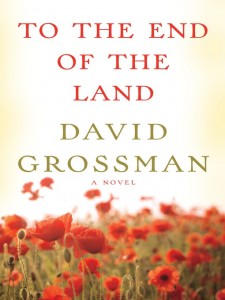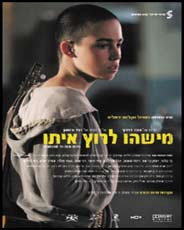Feminists in Focus: David Grossman on Film
 There has been a lot of attention given recently to David Grossman’s newest work of fiction, To the End of the Land, in which the novelist presents a tremendously human drama about the burdens of living in a society at war. And, as we know, Grossman himself paid a most bitter price, having lost his son in the Second Lebanon War of summer 2006.
There has been a lot of attention given recently to David Grossman’s newest work of fiction, To the End of the Land, in which the novelist presents a tremendously human drama about the burdens of living in a society at war. And, as we know, Grossman himself paid a most bitter price, having lost his son in the Second Lebanon War of summer 2006.
But two of Grossman’s previous novels, not focused on issues of war, have recently been adapted into feature films: Someone to Run With and The Book of Intimate Grammar. Although very different from each other, both of these are stories of the challenges of growing up, and both deal heavily with issues of gender in our society. In both stories, the young people are presented with a world that needs changing – in one story the young heroes stand up to the challenge; in the other, the hero succumbs.
Someone to Run With (2006)
Directed by Oded Davidoff, screenplay by Noah Stollman
 Set against the background of Jerusalem, this is the story of two teens, both of whom have the strength and courage to fight back against the world of drugs and teen exploitation. It is summertime in Jerusalem. Tamar receives a phone call from someone who needs her help. She is a 16-year-old girl who cuts off all her hair, and sets out with her guitar and her dog to live on the streets of Jerusalem. In her desperate search for a delicate boy (who later turns out to be her brother), she is sucked into the world of rough gangs that exploits street kids for drug trafficking and pick-pocketing.
Set against the background of Jerusalem, this is the story of two teens, both of whom have the strength and courage to fight back against the world of drugs and teen exploitation. It is summertime in Jerusalem. Tamar receives a phone call from someone who needs her help. She is a 16-year-old girl who cuts off all her hair, and sets out with her guitar and her dog to live on the streets of Jerusalem. In her desperate search for a delicate boy (who later turns out to be her brother), she is sucked into the world of rough gangs that exploits street kids for drug trafficking and pick-pocketing.
Parallel to Tamar’s story is the story of Assaf, whose summer job has assigned him to find the owner of Tamar’s runaway dog. Obviously a teenager who takes his responsibilities seriously, Assaf is committed to finding the owner of the dog and as a result, he compulsively follows the dog around the city of Jerusalem, slowly unraveling the story of Tamar.
Tamar has taken upon herself something that her parents were unwilling or unable to do. Perhaps hiding from the shame of their son’s drug addiction, they have gone abroad for the summer. Tamar, on the other hand, a determined young woman, has the strength and commitment to fight against the world of crime in her city in order to save her older, weaker, artistic brother.
Combining music with stark, gritty realism, this is also an ode to the city of Jerusalem, which is an extraordinary part of the film. As Assaf and the dog relentlessly and frenetically run from place to place, searching for Tamar, they encounter much of the city and its life — its alleyways and parks, its shops and outlying districts, Jews and non-Jews, and its world of crime.
 Intimate Grammar (2010)
Intimate Grammar (2010)
Directed and written by Nir Bergman
Also set in Jerusalem, this poignant film takes us back to the mid-1960’s, to a dreary and seedy housing project. Aaron seems to be a poetic and imaginative boy, but life has him feeling dejected. He is very short and is not growing, and his over-bearing mother accuses him of doing it on purpose to spite her! Perhaps he is doing it on purpose since he doesn’t seem attracted to the adult world that he sees around him, especially his parents’ loveless marriage and bleak lifestyle.
Aaron enjoys pranks and escapades, and he has fantasies of himself as a Houdini character, often having himself locked up. Usually he needs to be saved from one of his tricks. But will his friend be there to save him the next time and the next time? As his friends grow up, Aaron is left behind with his childish fantasies and pranks, painfully lonely.
The film is significant for the portrayals of the women in Aaron’s life. There is his sharp-tongued, demanding and spiteful mother (played by Orly Zilbershatz, who also played the mother in a remarkable performance in Nir Bergman’s first feature, Broken Wings), his aging grandmother, his overweight older sister an even his maturing girlfriend, all of whom are incapable of providing him with the emotional support that he so desperately needs. Grasping for something, he finds himself attracted to a refined, cultured and soft-spoken neighbor, a good-looking woman who enjoys music and books, a woman who can be seen in stark contrast to his mother. But the viewer’s image of this woman turns strangely grotesque as the narrative develops.
Aaron is not at all capable of taking charge of his surroundings and altering them for the better. Aaron’s stilted growth and reluctance to mature can be seen, on the one hand, as a reflection of his adolescent unhappiness. On the other hand, it is also a metaphor for the State of Israel — this was a depressing period (before the coming-of-age of the Six Day War) when people didn’t have a lot of money, when the basic existence of the state was still doubtful, when life was bleak and even going to a concert or the opera was out of the question.
“Intimate Grammar” took the top prize at the Tokyo International Film Festival and top prize for best Israeli feature film at the Jerusalem International Film Festival. According to the Jerusalem jury, the film was noted “for its penetrating description conveyed in cinematic language, illustrating the internal world of the youth and adults, while transmitting a strong sense of time and space.”
–Amy Kronish blogs at www.israelfilm.blogspot.com




One comment on “Feminists in Focus: David Grossman on Film”
Comments are closed.